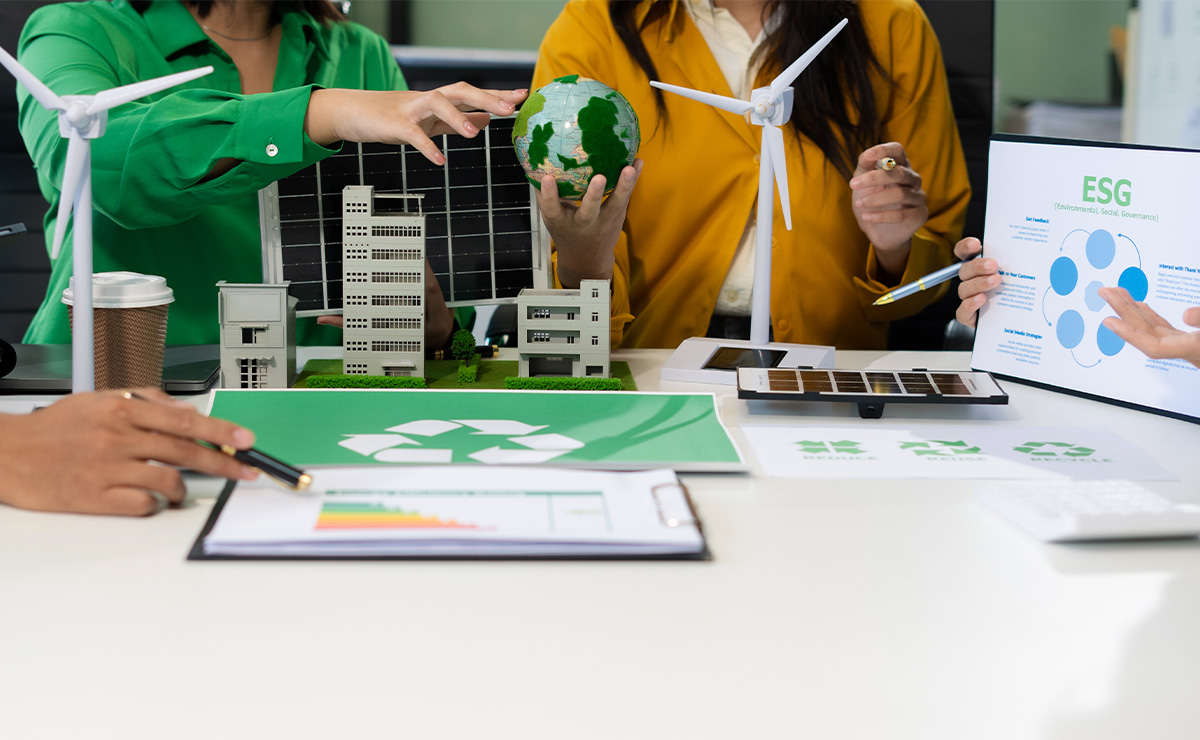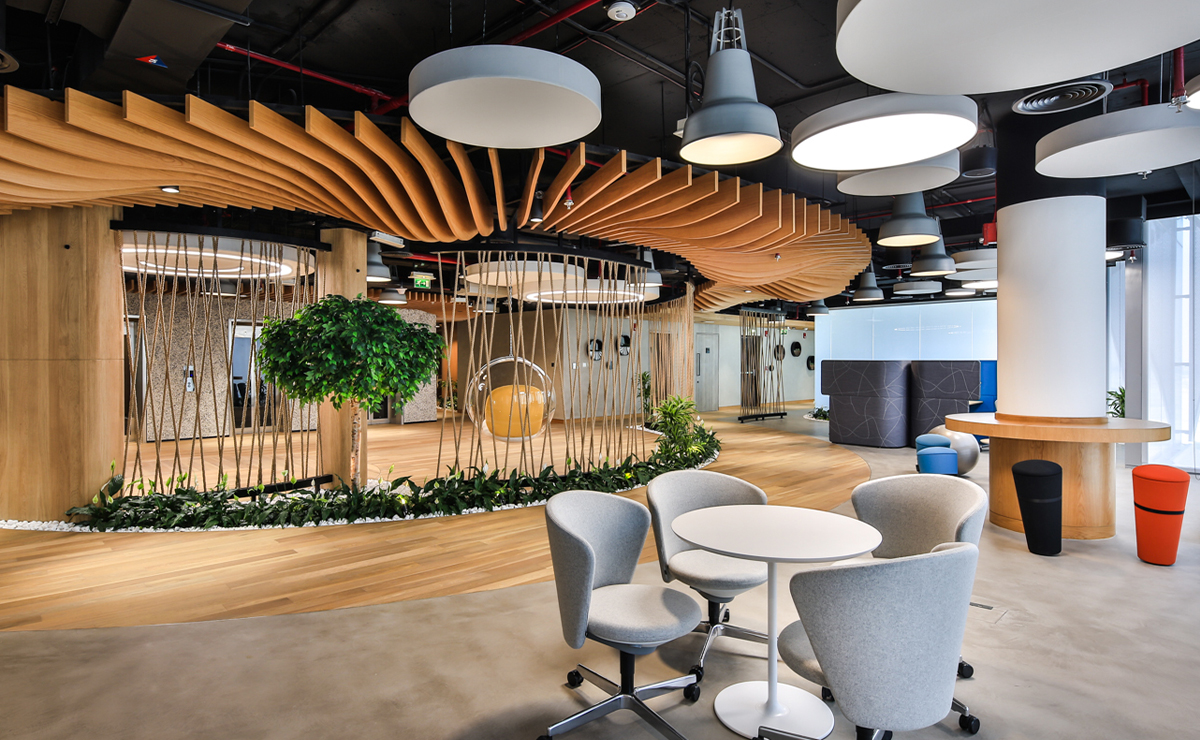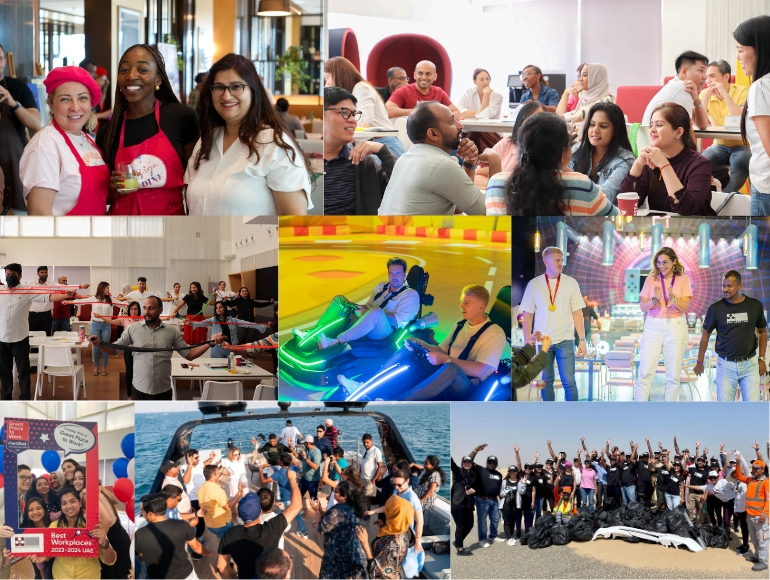

Nicola Trivett
General Manager & Sustainability Leader
Sustainable workplaces are key for modern businesses in 2024, as they increasingly evolve from a trend to a legislatory necessity. This shift isn’t just good for the planet; it also boosts efficiency and staff morale.
This article outlines the top eight practices that can be implemented to transform offices into sustainable havens this year. From green energy adoption to sustainable commuting, we’ll show how these changes are making a real difference. Read on to learn how your workplace can join this green revolution, simultaneously benefiting the environment, your team, and your bottom line.
1. Energy and Efficiency
2024 has seen a significant shift towards green energy solutions in the workplace. Solar panels and wind turbines are becoming commonplace, providing clean, renewable energy that drastically cuts down carbon emissions. Alongside green energy sources, energy efficiency comes into play. Modern offices are adopting energy-efficient lighting and advanced HVAC systems that use less power and reduce utility bills. Smart technologies play a big role here, with IoT devices and AI systems automatically adjusting settings to optimize energy use, ensuring that no watt is wasted.
The cultural shift towards energy consciousness is equally important. Encouraging employees to embrace simple habits, like turning off lights and electronics when not in use, can have a substantial impact. Utilizing natural light presents another advantage, reducing the need for artificial lighting and creating a more pleasant work environment. With environmental regulations tightening globally, adopting green energy solutions isn’t just an ethical choice—it’s a strategic one. Businesses that lead in this area not only contribute to a healthier planet but also position themselves as attractive places to work and do business with, drawing in clients and talent who prioritize sustainability.
As the push for sustainability grows stronger, companies that integrate green energy solutions into their operations are seeing benefits beyond just environmental impact. They experience cost savings from reduced energy consumption, an enhanced reputation in the marketplace, and increased employee satisfaction. These practices demonstrate a commitment to not just the bottom line, but also to the well-being of the planet and the people who live on it. Businesses looking to stay competitive in an increasingly eco-conscious market will find that green energy solutions are an essential component of their sustainability strategy.
2. Championing Sustainable Commuting
The commute to work is a significant contributor to carbon emissions, but some innovative companies are changing the game with sustainable commuting initiatives. They’re encouraging employees to leave their cars at home and opt for greener alternatives like public transit, biking, or walking. To support this shift, businesses are offering incentives like subsidized transit passes, secure bike storage, and even financial bonuses for those who choose eco-friendly commuting options. The rise of remote and flexible work arrangements has also played a crucial role, drastically reducing the need for daily commutes and contributing to lower overall emissions.
Installing electric vehicle (EV) charging stations at the workplace is another strategy gaining traction. This not only supports employees who choose to drive electric but also aligns with broader environmental goals by promoting the adoption of cleaner transportation technologies. The commitment to sustainable commuting practices sends a powerful message about a company’s values, enhancing its reputation as a responsible and forward-thinking employer.
The benefits of promoting sustainable commuting extend far beyond reducing carbon footprints. They contribute to healthier lifestyles for employees, who may enjoy more exercise and less stress from avoiding traffic jams. Furthermore, these initiatives can lead to increased productivity and job satisfaction, as employees feel supported in their eco-conscious choices. As more companies adopt sustainable commuting practices, they not only make a significant impact on the environment but also create a more engaged and motivated workforce, setting a new standard for what it means to be a responsible employer in the 21st century.
3. Sustainability as Part of Company Culture

Creating a sustainable workplace in 2024 goes beyond implementing eco-friendly practices in developing a culture where sustainability is a core value shared by everyone. This means extending beyond recycling programs to embrace comprehensive strategies that address all aspects of sustainability, from reducing waste to conserving resources. Companies are finding innovative ways to minimize their environmental impact, such as using digital tools to reduce paper use, sourcing sustainable materials for office supplies, and even incorporating green spaces into office designs to improve air quality and employee well-being.
Education and engagement are key to embedding sustainability into the workplace culture. Companies are hosting workshops, challenges, and awareness campaigns to involve employees in their sustainability efforts, making eco-friendly practices a part of daily office life. By empowering employees to contribute ideas and take action, businesses can harness the collective power of their workforce to drive meaningful change.
The impact of a strong sustainability culture is profound. It not only helps businesses achieve their environmental goals but also attracts and retains top talent, particularly among younger generations who prioritize employers with strong environmental credentials. In an era where companies are scrutinized for their impact on the planet, those that successfully foster a culture of sustainability stand out for their commitment to making a positive difference. This commitment to sustainability is becoming a hallmark of modern, successful businesses, reflecting a deep understanding that the health of our planet and the well-being of our people are inextricably linked.
4. Enhancing Recycling and Waste Management
Recycling and waste management are pivotal in the sustainable workplace landscape of 2024. Innovative technologies and methodologies are significantly improving the efficiency and effectiveness of recycling programs. The integration of the Internet of Things (IoT) in waste management, known as the “Internet of Waste,” revolutionizes traditional practices. IoT-enabled devices, such as fill-level sensors in bins and material quality sensors, optimize waste collection and sorting, ensuring resources are allocated more efficiently and waste collection schedules are responsive to actual needs.
Advanced recycling technologies are making strides, particularly in areas like chemical recycling, which converts waste back into high-quality raw materials without degrading their quality. This approach is vital for plastics and complex materials that traditionally pose challenges in recycling processes. Automation in waste sorting, facilitated by AI and robotics, is enhancing the precision and speed of separating recyclables from waste streams, ensuring a higher volume of materials is reclaimed and repurposed.
Moreover, the application of blockchain technology in tracking the lifecycle of materials from production through to recycling is ensuring greater transparency and efficiency in recycling processes. This not only aids in the diversion of waste from landfills but also supports the creation of a more sustainable and closed-loop supply chain, aligning with the principles of the circular economy.
The focus on innovative composting techniques and the exploration of sustainable materials and product designs further contribute to reducing waste generation. These efforts are complemented by legislative advancements and increased funding for recycling infrastructure, which are expected to propel significant progress in organics recycling and other recycling initiatives. As businesses continue to adopt these advanced waste management and recycling practices, they not only contribute to environmental sustainability but also set new industry standards for responsible waste handling and resource conservation.
5. Prioritizing Sustainable Procurement
Sustainable procurement is increasingly recognized as a critical component of corporate sustainability strategies in 2024. Businesses are diligently assessing their supply chains to ensure that their procurement practices align with environmental and ethical standards. This involves selecting suppliers and products that demonstrate a commitment to sustainability, from the use of renewable energy sources in manufacturing processes to the implementation of waste reduction measures.
The move towards sustainable procurement is driven by a broader understanding of the circular economy, where products are designed with their end-of-life in mind, promoting reuse and recycling. Companies are opting for products that are not only biodegradable but also designed for circularity, ensuring that they can be easily repurposed or recycled, thereby minimizing waste and extending the lifecycle of materials. Blockchain technology is emerging as a valuable tool in this space, offering unmatched transparency and traceability in the supply chain. This allows businesses to verify the sustainability credentials of their suppliers and the materials they use, further reinforcing their commitment to sustainable practices.
Adopting sustainable procurement practices not only helps businesses reduce their environmental footprint but also supports social responsibility by ensuring fair labor practices and contributing to economic sustainability. This holistic approach to procurement supports the broader goals of sustainability, encompassing environmental, social, and economic dimensions. It underscores the significant influence businesses have in promoting sustainability through their purchasing decisions.
As sustainable procurement practices continue to evolve, they are setting new standards for responsible business operations. Companies that lead in this area are not only meeting their sustainability goals but also enhancing their market competitiveness and building stronger, more ethical supply chains. This commitment to sustainable procurement reflects a deep understanding of the interconnectedness of environmental, social, and economic sustainability, and the role businesses play in advancing global sustainability efforts.
6. Empowering Sustainable Workspaces Through Technology
Technology is a key driver in the evolution of sustainable workplaces in 2024, offering innovative solutions that reduce environmental impact and enhance operational efficiency. Smart building technologies, leveraging the power of the Internet of Things (IoT), are transforming traditional office environments into intelligent, energy-efficient spaces. IoT devices control lighting, heating, and cooling systems dynamically, based on real-time occupancy data, significantly reducing energy waste and improving the comfort of workplace environments.
Artificial intelligence (AI) plays a crucial role in optimizing waste management and recycling processes. AI algorithms improve the routing of waste collection vehicles, reducing fuel consumption and emissions, while AI-powered sorting systems enhance the accuracy and efficiency of recycling operations. This technological advancement not only supports environmental sustainability but also contributes to economic efficiencies by reducing operational costs.
Emerging technologies such as pneumatic waste collection systems and solar-powered compactors are redefining waste management in urban office settings. These systems offer cleaner, more efficient alternatives to traditional waste collection methods, reducing the carbon footprint associated with waste management and contributing to cleaner, more sustainable urban environments.
The application of technology in sustainable workplace practices extends beyond operational efficiencies. Digital tools and platforms are facilitating remote work and digital collaboration, reducing the need for paper and physical resources, and minimizing the environmental impact associated with commuting and business travel. As technology continues to advance, it opens up new possibilities for businesses to innovate in sustainability, from reducing energy consumption and waste to enhancing resource efficiency and promoting a culture of environmental responsibility.
The integration of technology in sustainable workplace practices not only streamlines operations but also sets a new benchmark for environmental stewardship in the corporate world. It reflects a commitment to leveraging innovation for sustainability, ensuring that workplaces not only minimize their environmental impact but also contribute to a more sustainable and resilient future.
7. Leadership and Governance in Sustainability
Leadership is crucial in steering an organization towards sustainable practices. Effective leaders embody and promote a culture of sustainability, integrating it into the company’s vision and strategy. They set clear, ambitious goals for reducing the company’s environmental impact and ensure these goals are woven into the fabric of daily operations. This top-down commitment is essential for fostering a workplace that values and practices sustainability at every level.
Governance structures play a key role in sustainability efforts. Establishing policies, setting up dedicated sustainability committees, and implementing transparent reporting mechanisms are all governance strategies that reinforce a company’s commitment to sustainability. These structures provide a framework for accountability, enabling the tracking of progress against sustainability goals and ensuring continuous improvement.
Transparency in sustainability efforts is increasingly important. Leaders who openly communicate their sustainability initiatives and progress build trust with employees, customers, and investors. Sharing both successes and challenges encourages a collaborative approach to sustainability, inviting input and innovation from all stakeholders. This open dialogue is key to advancing sustainable practices and achieving long-term environmental, social, and economic goals.
8. Technology Smartens Up Sustainable Practices
Technology is a powerful enabler of sustainable practices in the workplace. Digital tools and platforms, such as energy management systems and virtual collaboration tools, are transforming how businesses approach sustainability. These technologies allow companies to monitor and optimize energy use, reduce resource consumption, and facilitate remote work, thereby minimizing the environmental impact of their operations.
Data analytics is at the heart of technology-driven sustainability. By analyzing data from various sources, companies can gain insights into their environmental footprint, identify areas for improvement, and measure the impact of their sustainability initiatives. This data-driven approach enables more targeted and effective sustainability strategies, enhancing the overall efficiency and environmental performance of the workplace.
Innovative technologies are continually emerging, offering new opportunities to enhance sustainability. From AI and IoT to green web hosting and sustainable app development, these advancements are expanding the possibilities for sustainable workplace practices. As technology continues to evolve, it will play an increasingly important role in driving sustainability efforts, offering new ways to reduce environmental impact and promote a culture of sustainability within the workplace.
The Future of Sustainable Workplaces
The future of sustainable workplaces is characterized by a deep integration of green practices into every aspect of business operations. As awareness of environmental issues continues to grow, businesses are recognizing the importance of adopting sustainable practices not only for the benefit of the planet but also for their employees, customers, and bottom line. The continuous innovation in sustainable practices and technologies is enabling businesses to reduce their environmental impact more effectively than ever before.
Adaptation and innovation are key to the future of sustainable workplaces. Businesses must remain agile, embracing new sustainable practices and technologies as they emerge. This proactive approach is essential for staying ahead of regulatory changes, meeting evolving stakeholder expectations, and seizing opportunities to lead in sustainability.
Ultimately, the move towards more sustainable workplaces is an ongoing journey that offers significant benefits for businesses, their employees, and the broader community. By committing to sustainability, businesses can create healthier, more productive work environments, enhance their competitiveness, and contribute to a more sustainable future.
Start your journey to a greener tomorrow, today – transform your office into a model of sustainability with Summertown’s expert solutions.
SOURCES
StartUs Insights – Top 8 Waste Management Industry Trends (2024)
StartUs Insights – Top 10 Renewable Energy Trends in 2024
Recycle Track Systems – various.
Officernd.com – The Importance Of A Sustainable Workplace
Deloitte – 2024 Renewable Energy Industry OutlookDeskbird – The 11 Most Predictable Workplace Trends for 2024

Nicola Trivett
General Manager & Sustainability Leader




















